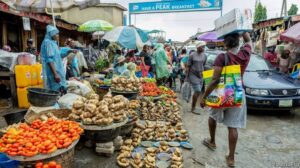Why are we so prone to deceiving one another in Nigeria?
By – Abayomi Odunowo.
Picture this: a trailer loaded with baskets of tomatoes embarking on a long journey from the northern parts of Nigeria to the south. The cost of transportation alone is a staggering N3,500,000 to N3,700,000, depending on the size of the trailer. This exorbitant cost is due to the poor state of our road infrastructure and the lack of a functional rail system that could significantly reduce transportation costs.
If we break it down further, a 10 wheel trailer carries 350 baskets of tomatoes, while a 12 wheel trailer carries 370 baskets. The cost of transporting of one basket is N10,000 by road, which adds up to millions of naira when multiplied by the number of baskets carried. This cost could be reduced to just N500 per basket if a reliable rail system was available for transportation.
The sad reality is that the current state of our transportation system is not only driving up the cost of essential goods like tomatoes, but it is also contributing to the overall high cost of living in Nigeria. Imagine a situation where a basket of tomatoes that should ideally cost N1,000 is being sold for between N150,000 to N200,000 in some parts of the country. This is unacceptable and unsustainable.
One possible solution to this problem is to invest in the development of a comprehensive rail network that connects all 36 states of Nigeria and the Federal Capital Territory. By doing so, we can significantly reduce the cost of transporting goods like tomatoes across the country. This would not only benefit consumers who would have access to more affordable goods, but it would also boost the economy by reducing inflation and increasing the purchasing power of the average Nigerian.
The breakdown of the real costs of tomatoes in Nigeria reveals a deep-seated issue with our transportation infrastructure. By addressing this issue and investing in the development of a reliable rail system, we can significantly reduce the cost of essential goods like tomatoes and improve the overall standard of living for the Nigerian people. It is time for the government to take decisive action and prioritize the development of our transportation infrastructure for the benefit of all.
Cost of Tomatoes N25,000 x 350 = N8,750,000. Transportation N10,000 x 350 = N3,500,000. Total = N12,500,000. If you divide the total cost by the quantity it gives us N35,000 for cost and transportation even if you make N25,000 the selling price N60,000 and nothing close to N150,000 – N200,000. So How much where they selling before and during Sallah between N150,000 – N200,000?
Thus making more profit than everybody in the value chain, this Extraordinary Profiteering is unacceptable. It is disheartening to see how some individuals within the value chain are taking advantage of the situation to exploit both the farmers and the consumers. This greed and exploitation have a ripple effect on the general populace, making life even more difficult for the suffering masses.
What is even more concerning is that this exploitation is not the result of government intervention or external factors; it is solely driven by the greed of individuals within the system. We, as Nigerians, should hold ourselves accountable for these actions and work towards creating a more fair and equitable system for all stakeholders involved.
One solution to combat this issue is to remove all the middlemen who are intentionally inflating prices for their own benefit. By connecting farmers directly with consumers, we can eliminate intermediaries who add unnecessary costs to the supply chain. This direct-to-consumer model not only benefits the farmers by ensuring they receive fair compensation for their produce but also allows consumers to access affordable prices.
Furthermore, it is essential for us as a society to take responsibility for our actions and refrain from participating in this vicious cycle of exploitation. We must prioritize honesty, transparency, and fairness in our transactions to create a sustainable and ethical marketplace.
Additionally, it is high time for Southerners to take control of their food production and start feeding themselves. By investing in local agriculture and supporting small-scale farmers, we can reduce our dependence on expensive imported goods and create a more self-sufficient food system.
It is imperative that we address the issue of profiteering and exploitation within the value chain to create a more equitable and sustainable system. By working together to eliminate middlemen, support local farmers, and prioritize ethical practices, we can create a marketplace that benefits all stakeholders involved. Let us strive towards a future where fairness, transparency, and compassion guide our interactions, rather than greed and exploitation.
Otunba Abdulfalil Abayomi Odunowo
National Chairman AATSG
Mobile : +2349053535322
Follow us on our Whatsapp Channel









